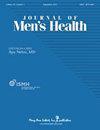SARS-CoV-2 Spike Protein Influences Expression of ICOSL and ICAM-2 in Prostate Cancer
IF 0.6
4区 医学
Q4 Medicine
引用次数: 1
Abstract
Background: Severe acute respiratory syndrome coronavirus 2 (SARS-CoV-2) is the novel coronavirus responsible for the COVID-19 pandemic. The viral protein of SARS-CoV-2, spike protein (SP), mediates entry into host cells, contributing to pathogenesis of COVID-19. Prostate cancer is the most common cancer among men in the United States. Inducible T-cell costimulator ligand (ICOSL) and intercellular cell adhesion molecule 2 (ICAM-2) are expressed in cancer cells and their roles in cancer growth remain controversial. It is unknown if SP can affect the expression of ICAM-2 or ICOSL in prostate cancer. This study investigated the effects of SARS-CoV-2 SP on the expression of ICAM-2 and ICOSL and the time-dependent effect of SP on growth and survival of prostate cancer cells. Methods: The effect of SARS-CoV-2 SP on the survival of a widely-used prostate cancer cell line, LNCaP, was assessed using clonogenic cell survival assay and quick cell proliferation assay. Reverse transcription-polymerase chain reaction (RT-PCR) and immunohistochemistry (IHC) were performed to investigate the expression of ICAM-2 and ICOSL. The survival of an additional prostate cancer cell line, PC-3, was also evaluated by clonogenic survival assay. Results: After 3 days, a significant decrease in the percentage of colonies in LNCaP cells treated with SP was found, which was paralleled by a decrease in optical density (OD) value in LNCaP cells in the presence of SP. A significant decrease in the percentage of colonies treated with SP was also found in PC-3 cells evaluated by clonogenic survival assay. In addition, the mRNA expression of ICAM-2 was lower, whereas the mRNA expression of ICOSL was higher in SP-treated LNCaP cells. This was supported by protein expressions for ICAM-2 and ICOSL evaluated with IHC. Conclusions: In LNCaP cells, SARS-CoV-2 SP downregulates the expression of ICAM-2 but upregulates the expression of ICOSL. SARS-CoV-2 SP inhibits growth of prostate cancer cells in a time-dependent manner. Further studies are needed to fully address the roles of ICAM-2 and ICOSL in the inhibition prostate cancer growth by SARS-CoV-2 SP.SARS-CoV-2刺突蛋白对癌症前列腺ICOSL和ICAM-2表达的影响
背景:严重急性呼吸综合征冠状病毒2 (SARS-CoV-2)是导致COVID-19大流行的新型冠状病毒。SARS-CoV-2的病毒蛋白刺突蛋白(spike protein, SP)介导进入宿主细胞,参与COVID-19的发病机制。前列腺癌是美国男性中最常见的癌症。诱导型t细胞共刺激配体(ICOSL)和细胞间细胞粘附分子2 (ICAM-2)在癌细胞中表达,但它们在肿瘤生长中的作用仍存在争议。SP是否能影响前列腺癌中ICAM-2或ICOSL的表达尚不清楚。本研究探讨了SARS-CoV-2 SP对前列腺癌细胞ICAM-2和ICOSL表达的影响以及SP对前列腺癌细胞生长和存活的时间依赖性。方法:采用克隆细胞存活试验和快速细胞增殖试验,观察SARS-CoV-2 SP对前列腺癌细胞LNCaP存活的影响。采用逆转录聚合酶链反应(RT-PCR)和免疫组化(IHC)检测ICAM-2和ICOSL的表达。另外一种前列腺癌细胞系PC-3的存活也通过克隆生存试验进行了评估。结果:SP作用3天后,LNCaP细胞的菌落百分比显著降低,SP作用下LNCaP细胞的光密度(OD)值也显著降低。克隆生存实验显示PC-3细胞中SP作用后的菌落百分比也显著降低。此外,sp处理的LNCaP细胞ICAM-2 mRNA表达量较低,ICOSL mRNA表达量较高。IHC检测的ICAM-2和ICOSL蛋白表达支持了这一点。结论:在LNCaP细胞中,SARS-CoV-2 SP下调ICAM-2的表达,上调ICOSL的表达。SARS-CoV-2 SP以时间依赖性方式抑制前列腺癌细胞的生长。ICAM-2和ICOSL在SARS-CoV-2 SP抑制前列腺癌生长中的作用有待进一步研究。
本文章由计算机程序翻译,如有差异,请以英文原文为准。
求助全文
约1分钟内获得全文
求助全文
来源期刊

Journal of Men's Health
Medicine-Urology
CiteScore
0.70
自引率
28.60%
发文量
153
审稿时长
10 weeks
期刊介绍:
JOMH is an international, peer-reviewed, open access journal. JOMH publishes cutting-edge advances in a wide range of diseases and conditions, including diagnostic procedures, therapeutic management strategies, and innovative clinical research in gender-based biology. It also addresses sexual disparities in health, life expectancy, lifestyle and behaviors and so on. Scientists are encouraged to publish their experimental, theoretical, and descriptive studies and observations in as much detail as possible.
 求助内容:
求助内容: 应助结果提醒方式:
应助结果提醒方式:


